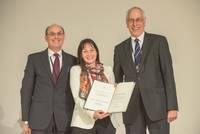

New Frontiers in Chemical Biology and Biochemistry
Chair: S. Raunser
program
Molecules of Life - Molecules in Life
Joint symposium of the GDCh Divisions for biochemistry and the Liebig Association for Organic Chemistry as well as the joint Division for chemical biology
Session I
- Photoswitches for reversible control of gene expression (O. Vazquez, Marburg)
- Weak effects on electron transfer reactions (S. Landgraf, Graz)
- iSPAAC: isomer-free strain-promoted azide-alkyne cycloaddition for generating large inhibitors of protein-protein interactions (T. Berg, Leipzig)
- From Peptido RNA to Translation (C. Richert, Stuttgart)
- “Multilingual enzymes”: Dissecting specificity in the ubiquitin system through chemical biology (M. Gersch, Dortmund)
Session II
- Robust Fluorescent Light-up Aptamers for Super-resolution Microscopy (F. Grün, Heidelberg)
- In situ detection of the strain-induced radicals in human hair: Combined EPR-strain technique (E. Dmitrieva, Dresden)
- Biochemistry funding awards 2023 from the GDCh Division of Biochemistry
Session III
- A versatile “Synthesis Tag” (SynTag) for chemical protein synthesis (N. Hartrampf, Zurich)
- Drifting in the structure of cell penetrating DNA- and RNA-binding nucleopeptides (S. Tomassi, Naples)
- Custom-tailored Ligands to Visualize Cell Surface Proteins in vivo (J. Broichhagen, Berlin)
- Supramolecular Medicine: From basic research to gluten-related disorders (V. Dodero, Bielefeld)
Chemical Biology of Nucleic Acids & Proteins
Chairs: A. Rentmeister, HD Mootz
program
Molecules of Life - Molecules in Life
Organized by the GDCh Divisions biochemistry and Liebig Association as well as the joint Division chemical biology.
Session I - Chairs: Andrea Rentmeister, Pierre Stallforth
- Novel approaches to RNA imaging in live cells (A. Jäschke, Heidelberg)
- Interdisciplinary approaches to reveal parasite vulnerabilities (E. Derbyshire, Durham / UK)
- Awarding of the biochemistry Prize 2021 of the GDCh Division of Biochemistry
- Structure-based design and optimization of SARS-CoV-2 main protease inhibitors (L. Zhang, Lübeck)
- Development, characterization, and application of RNA catalysts for in situ labeling of target
RNA molecules (M. Ghaem Maghami, Würzburg)
Session II - Chair: Daniel B. Werz
- Direct Prebiotic Synthesis of DNA / RNA Nucleosides and Nucleotides (O. Trapp, Munich)
- Remote near infrared identification of pathogens with multiplexed nanosensors (S. Kruss, Bochum)
Canceled at short notice due to the corona pandemic.
Molecules of Life - Molecules in Life
Together with the GDCh Divisions Liebig-Vereinigung and medicinal chemistry as well as the joint Division chemical biology , the Division of Biochemistry the sessions "Molecules of Life - Molecules in Life". On September 16, 2019, the Young Scientist Award Biochemistry 2019 was awarded to the Division . program

The GDCh Division of Biochemistry actively supported the Conference by assuming the travel expenses of the speakers Uwe Bornscheuer (University of Greifswald; "Enzyme evolution"), Donald Hilvert (ETH Zurich: "De novo enzyme design") and Roland Kontermann (University of Stuttgart: "Antibody." fusion proteins for therapeutic applications "). program
During the Conference , the Albrecht-Kossel Award (GDCh Prize) was presented to Prof. Dr. Annette Beck-Sickinger awarded.
Molecules of Life - Molecules in Life
Together with the GDCh Divisions Liebig-Vereinigung and medicinal chemistry as well as the joint Division chemical biology , the Division of Biochemistry the sessions "Molecules of Life - Molecules in Life". program
From July 16 to 18, 2014, the GDCh's Division of Biochemistry, together with the DFG Priority Program 1623 "Chemoselective Reactions for the Synthesis and Application of Functional Proteins", hosted a Conference on "Bioorthogonal Chemistry" in the newly renovated Harnackhaus of the Max Planck Society in Berlin-Dahlem.
Bioorthogonal chemistry forms the basis of many modern detection and visualization methods in cell and molecular biology as well as in numerous areas of medical research. High-throughput sequencing and ?omics? research would not exist without bioorthogonal chemistry. New biomaterials, artificial genetic systems and artificial metabolic pathways are other important research areas related to this topic. The 150 participants of the Conference, including numerous doctoral students, discussed lively in thematically focused sessions on established and new reactions for the modification and labeling of biomolecules in vitro and on the visualization and labeling of biomolecules in living cells. The second half of the Conference then dealt with the interplay of chemistry and proteomics, RNomics and glycomics as well as synthetic biology and new biomaterials. There were a total of 6 plenary and 23 short presentations, and 19 of the 59 registered posters were selected and presented in three-minute short presentations.
The program began with a plenary lecture by Floris van Delft (Nijmegen, NL) on site-specific conjugation of glycoproteins, a topic of current relevance in pharmaceutical research. Tom Brown (Oxford, UK) reported on the chemistry and biochemistry of the click ligation of nucleic acids. Itaru Hamachi (Kyoto, JP) presented chemical strategies for labeling and manipulating proteins in living cells, while Hermen Overkleeft (Leiden, NL) reported on activity-based protein profiling of proteases and glycosidases. Two further, very interesting plenary lectures were given by Wilfried Weber (Freiburg) on smart biohybrid materials and by Phil Holliger (Cambridge, UK) on synthetic genetics.
Undoubtedly one of the highlights of the event was the awarding of the Albrecht Kossel Prize for the first time by the President of the GDCh, Dr. Thomas Geelhaar. The awardee Prof. Dr. Roland Lill (Marburg) gave an inspiring lecture on the biogenesis of iron-sulfur proteins in eukaryotes.
Overall, the Conference shed light on the interface between chemistry and the life sciences in an inspiring way.
Andres Jäschke (Heidelberg), Christian Hackenberger (Berlin)
This page has been machine translated. If you have any feedback or comments please feel free to contact us. 
last modified: 04.11.2024 15:59 H from Translator